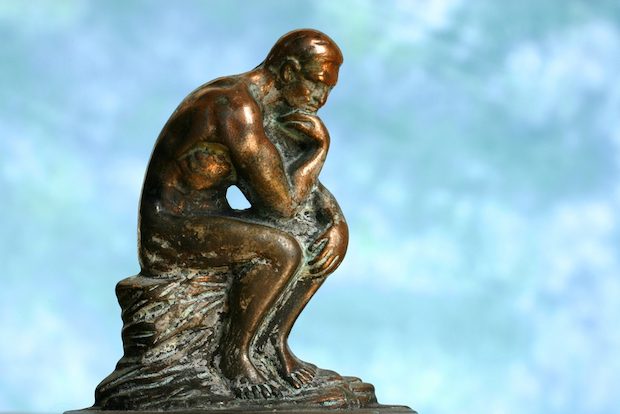The Weakness Of Reason

Jones, a reader of this blog, wrote this in response to the arguments here about pornography:
I’m starting to feel a familiar pattern across a lot of areas, just something I’m realizing personally. The longer you pay attention to these controversies, the more you start to understand history — why civilizations collapse, empires decay, wars get started. Reason is such a pathetically weak force. Our grasp on reality is so thin, and so filtered through ideology, through our own psychological needs . . . that’s all an aside (bound to sound somewhat hysterical, to those who come here to decry hysteria . . .) It doesn’t matter, in history, who has the “right answer,” or even whether anyone does. Our culture produces a lot of hyper-intellectual froth, to very little effect.
I agree. The other day at the Canadian conference where I spoke, a pastor rose during Q&A and said that he thought Peter Leithart and I were giving rational apologetics too little credit today. I responded that it’s simply not possible to reason with people who don’t share a common source of authority. But it’s even worse than that. These days, it’s quite possible to find oneself drawn into arguments with people who will share your premises, but reject your conclusion for no reason other than they don’t wish to accept what follows from those premises. Believe me, I’ve had those arguments.
People aren’t terribly interested in truth, because at worst it frightens them, and at best it makes them feel uncomfortable. Which is about the same thing.
Another reader writes:
If you missed All Things Considered on Friday afternoon because of your travels, then you missed a sterling example of Moralistic Therapeutic Deism-cum-emotivism in relation to the Pope’s new exhortation. Here is a link:
https://www.npr.org/2016/04/08/473557153/u-s-catholics-divided-over-pope-francis-family-life-guidelines
And here is the relevant quote, after a lead-in from Tom Gjelten, from a teacher at a Catholic school:GJELTEN: Metz says she made clear that church doctrine is not changing, but she highlighted the inclusive tone of the document. She thinks it may help young Catholics consider what relationship they will have with their church.
METZ: Is this something I really want to be a part of? Is this something that resonates with my understanding of what I believe Jesus Christ taught, of what I believe this church is about? They’re asking the question in order to see where they fit in.
“Is this something that resonates with my understanding of what I believe Jesus Christ taught? Of what I believe this church is about?” Here we see MTD-emotivism at its finest: all that matters is my personal interpretation of something and how that something makes me feel, even if I am nominally a part of a religious institution with a millennia-old understanding what what Jesus Christ taught.
So now if we’re not constantly flattered, constantly entertained, constantly reassured, constantly told that our North Star should always and only be our own subjective emotional response to a thing, then we are free to leave it behind. I have no idea how you form a society or culture — much less a religious body — with this kind of attitude. And what’s troubling is how difficult it is so see any other attitude in contemporary American life.
Yes.
Subscribe for as little as $5/mo to start commenting on Rod’s blog.